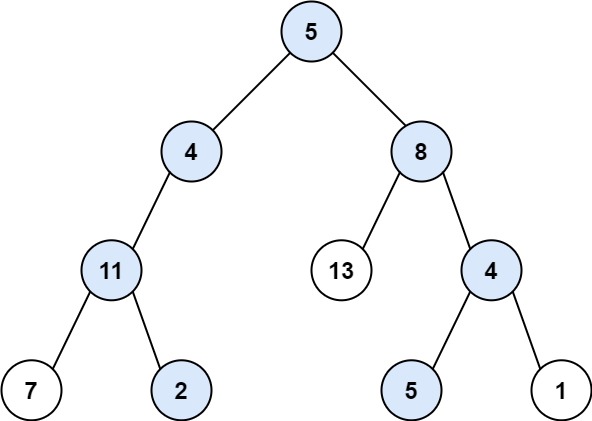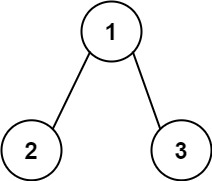1. question: 路径总和 II(中等)
给你二叉树的根节点 root 和一个整数目标和 targetSum ,找出所有 从根节点到叶子节点 路径总和等于给定目标和的路径。
叶子节点 是指没有子节点的节点。
来源:力扣(LeetCode)
链接:https://leetcode.cn/problems/path-sum-ii
示例 1:

1
2
| 输入:root = [5,4,8,11,null,13,4,7,2,null,null,5,1], targetSum = 22
输出:[[5,4,11,2],[5,8,4,5]]
|
示例 2:

1
2
| 输入:root = [1,2,3], targetSum = 5
输出:[]
|
示例 3:
1
2
| 输入:root = [1,2], targetSum = 0
输出:[]
|
提示:
1
2
3
| 树中节点总数在范围 [0, 5000] 内
-1000 <= Node.val <= 1000
-1000 <= targetSum <= 1000
|
2. answers
这道题和前面那道题类似,区别在于,这道题需要找出所有的路径,并且输出的是路径。其实找所有路径不难,难点在于怎么保存路径。因为以递归的思路来看,只有到达叶子节点时,才能知道到底能否满足要求,但是高层的节点已经遍历完了,我们不知道应不应该保存。
实际上,递归是会逐层返回高层的,完全可以在递归的时候返回当前层满足条件的子路径。逐层扩充到高层即可。代码如下所示:
1
2
3
4
5
6
7
8
9
10
11
12
13
14
15
16
17
18
19
20
21
22
23
24
25
26
27
28
29
30
31
32
33
34
35
36
37
38
39
40
41
42
43
44
45
46
47
48
49
50
51
52
53
54
55
56
57
58
59
60
61
62
63
64
65
66
67
68
69
70
71
72
73
74
75
76
77
78
79
80
81
82
83
84
85
86
87
88
89
90
91
92
93
94
95
96
97
98
99
100
101
102
| public class Solution_0062 {
public static List<List<Integer>> getPath(TreeNode tn, Integer targetSum) {
List<List<Integer>> result = new ArrayList<>();
if(tn.left == null && tn.right == null) {
if(targetSum - tn.val == 0) {
List<Integer> temp = new ArrayList<>();
temp.add(tn.val);
result.add(temp);
}
return result;
}
List<List<Integer>> left = new ArrayList<>();
List<List<Integer>> right = new ArrayList<>();
if(tn.left != null)
left = getPath(tn.left, targetSum - tn.val);
if(tn.right != null)
right = getPath(tn.right, targetSum - tn.val);
for(List<Integer> list: left) {
List<Integer> temp = new ArrayList<>();
temp.add(tn.val);
temp.addAll(list);
result.add(temp);
}
for(List<Integer> list: right) {
List<Integer> temp = new ArrayList<>();
temp.add(tn.val);
temp.addAll(list);
result.add(temp);
}
return result;
}
public static List<List<Integer>> pathSum(TreeNode root, int targetSum) {
List<List<Integer>> result = new ArrayList<>();
if(root == null) return result;
result = getPath(root, targetSum);
return result;
}
public static void main(String[] args) {
List<List<Integer>> result = pathSum(null, 4);
for(List<Integer> list: result) {
for(Integer i: list)
System.out.print(i + "\t");
System.out.println();
}
}
}
|
3. 备注
参考力扣(LeetCode)官网 - 全球极客挚爱的技术成长平台 (leetcode-cn.com),代码随想录 (programmercarl.com)。



